After a trash truck dumped a fiery load, dozens of mobile homes burned and an 89-year-old woman died
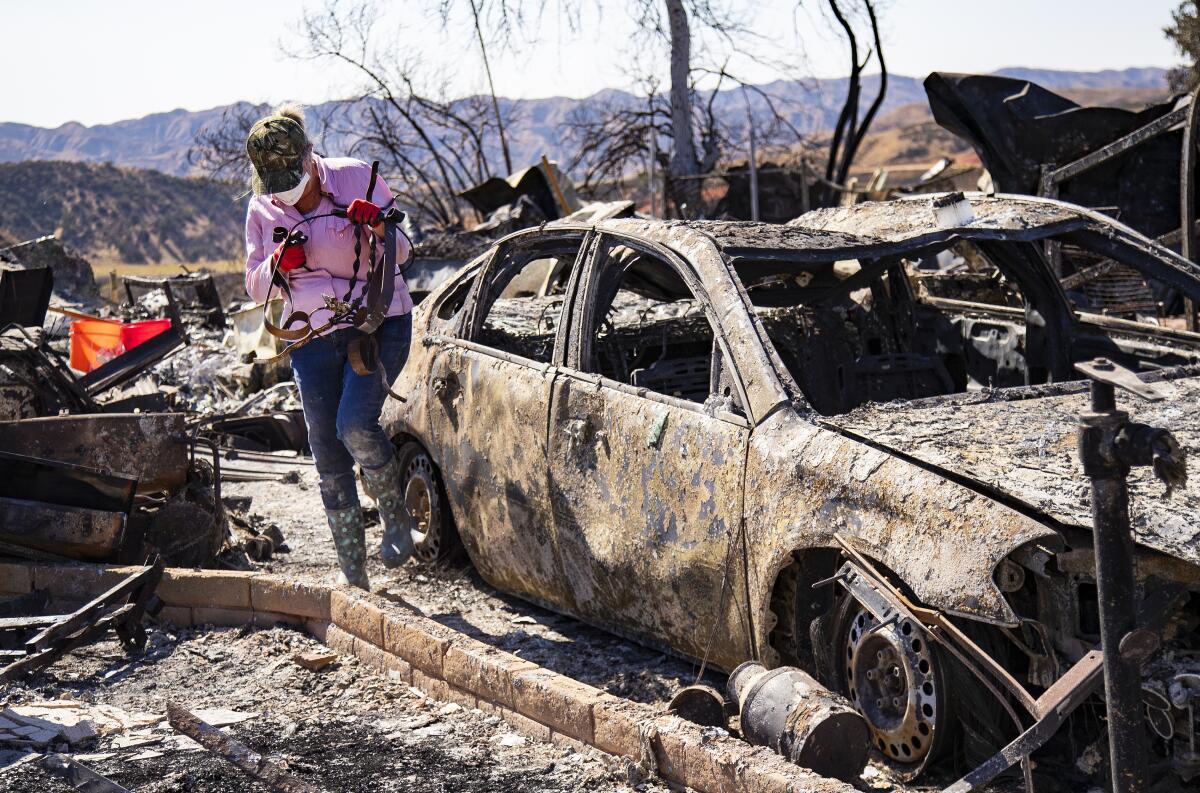
- Share via
As the siblings stared out at the blackened canyon, flecks of ash from the fire that stole their mother floated down on their shoulders. Even a week later, the stifling air in Calimesa still smelled of smoke.
For several hours this week, Don Turner and his older brother and sister camped outside Villa Calimesa mobile home park, waiting for officials to let them return to the rubble at plot E23 — the spot where, last Thursday, their mother, Lois Arvickson, 89, died near her phone inside her longtime home.
“It’s on fire,” Turner recalled his mother telling him, saying she needed to find her purse. Moments later, the phone cut out.
On Tuesday — five days since the deadly fire — Turner and many others with ties to the mobile home park stood outside a chain-link fence, staring inside and struggling to navigate their new reality. A young mother sobbed into her cellphone, saying she was desperate to get back inside her semi-charred home to retrieve clothes for her baby, and a man sitting in the bed of a pickup truck politely shooed away reporters.
“Please,” he said, softly, “we’ve talked to so many people.”
Another longtime resident paced 7th Street, past a circle of sheriff’s deputies guarding residents from entering, and approached a reporter.
“May I go on the record,” he said, his eyes filling with tears, “saying there were many, many lovely people who lived here.”
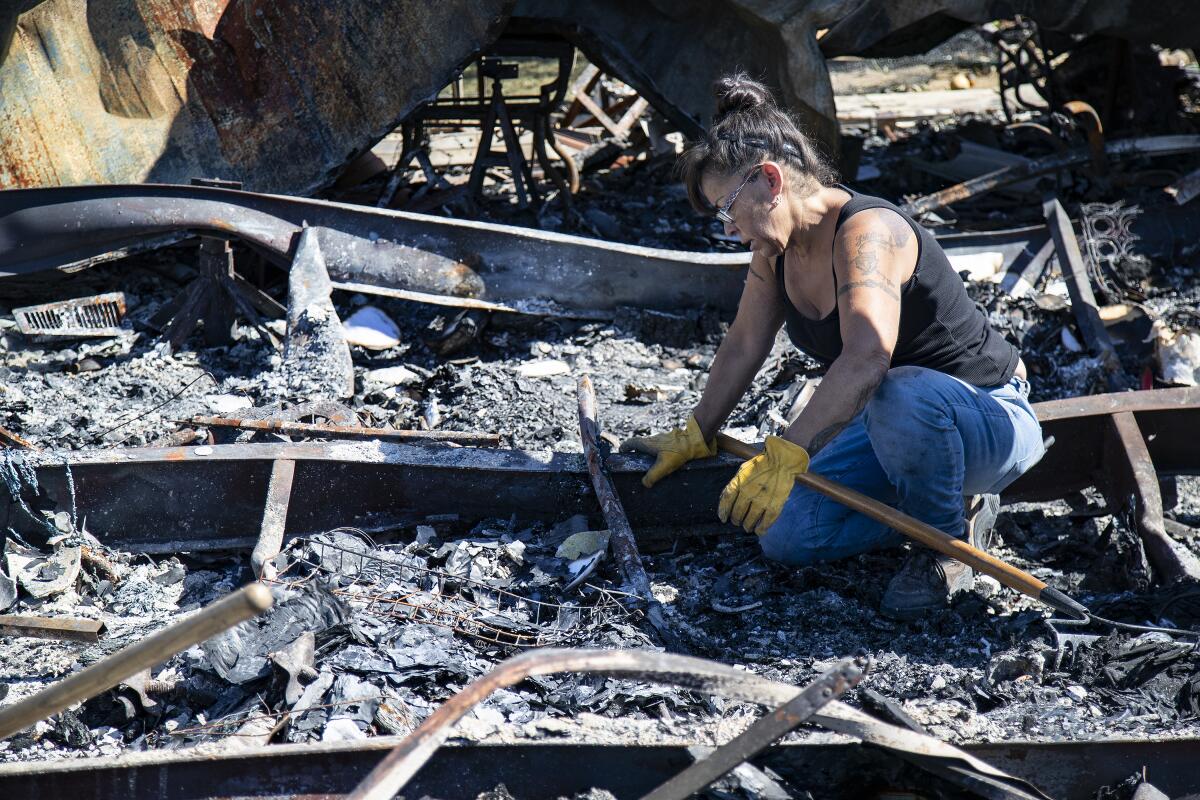
The Sandalwood fire, named for a street near the mobile home park, began last Thursday around 2 p.m. and burned more than 1,000 acres over five days. It started when the driver of a garbage truck dumped a “hot load” — a pile of burning trash — along the side of 7th Street, said Capt. Fernando Herrera, a spokesman for the California Department of Forestry and Fire Protection.
Garbage trucks often haul a dangerous cocktail of combustible items — batteries, pesticides, paint — and it’s not unheard of for drivers to dump a simmering load, Herrera said. Many residents of the mobile home park said it seemed unnecessarily reckless to drop the load next to a canyon of dry shrub backing up to the park. Ultimately, the fire destroyed 76 mobile homes and killed Arvickson and a second victim, whom officials haven’t yet publicly identified.
Riverside County homicide investigators were at the scene last week, but when asked Wednesday if the case had been presented to the Riverside County district attorney’s office — the entity that would bring criminal charges — sheriff’s officials declined to comment. The agency investigating the fire posted on Facebook on Wednesday, asking the public to share photographs and videos that could reveal details about the fire.
As the investigation continued, residents were focused on getting back inside the park. While deputies allowed residents to return for a few minutes on Monday, the park was closed to the public on Tuesday and Wednesday, as county health workers in white hazmat suits walked through the park. Officials reopened the park on Thursday, saying residents could return only to clean up and retrieve belongings but that it still wasn’t safe to live in the area. While residents said they understood the precaution — their homes were old and no doubt had lead paint and asbestos — they grew anxious. They were tired of the limbo.
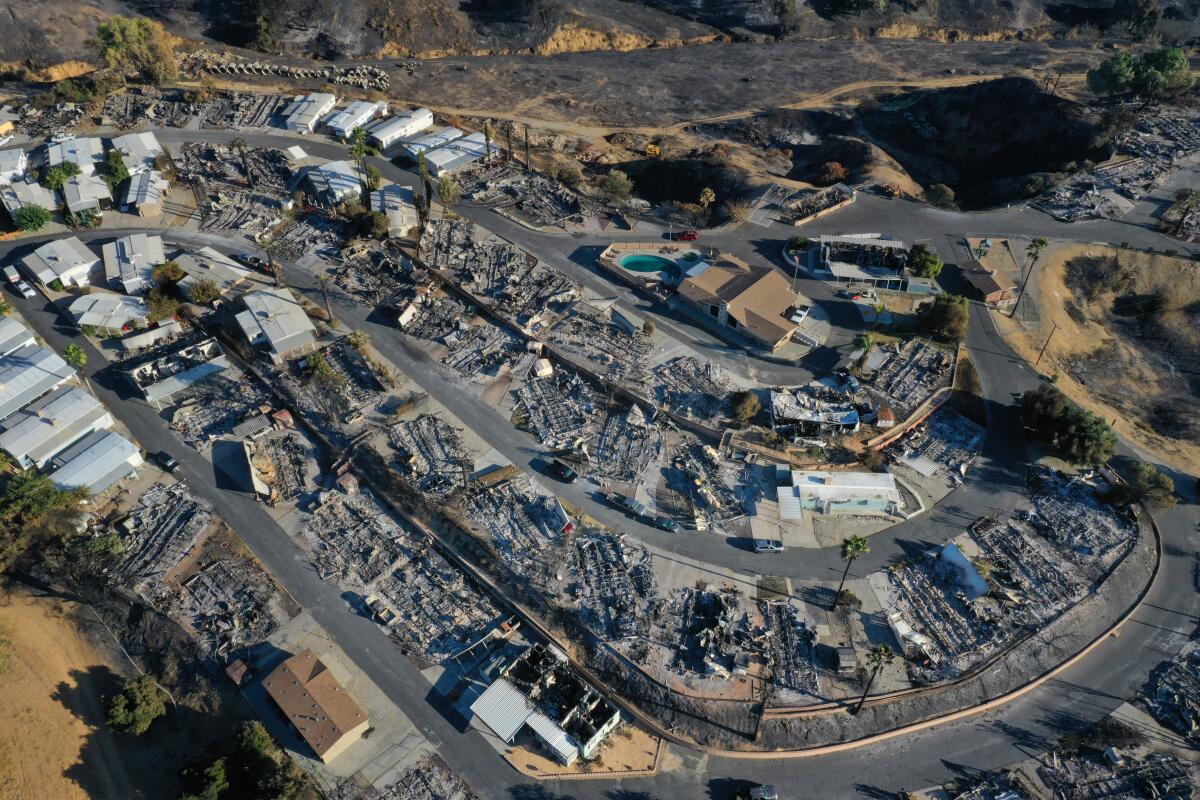
While they waited Tuesday, residents wrapped one another in long hugs and whispered about who the second victim might be. They swapped insurance information and asked about their long-term plans, knowing that even the surviving mobile homes might not be habitable for a while. Maybe the homes could be hauled out, a resident’s father mused, but would another park accept them?
For the park’s older and disabled residents, many of whom lived on tight budgets, Villa Calimesa had been a rare blessing in Southern California: an affordable, safe and well-maintained park with a pool and a clubhouse. It was a place where, if you’d been here more than a year or two — and most residents had — your neighbors not only knew who you were but had given you a nickname. There was the Goth Grandma down the street and the so-sweet-she-gave-you-a-cavity Old Lady.
That was Arvickson.
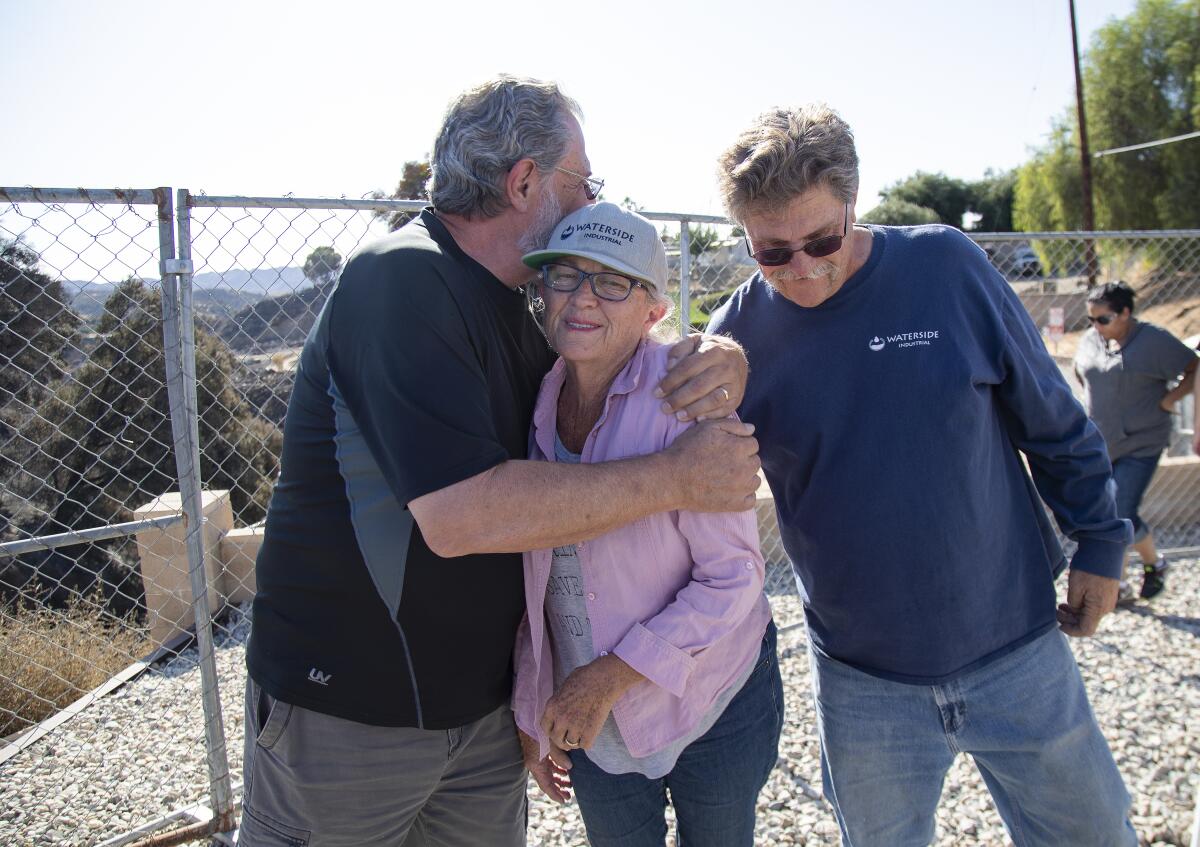
Well-trimmed hedges line the main road and a small, yellow sign reads “NOT A THROUGH STREET” — a reminder that there is only one road in and out of the park. As ambulances poured in last Thursday, residents’ cars squeezed out beside them.
Bill Kellison, 86, was outside pulling weeds last Thursday when he saw a trash truck dump something near Jack in The Box. Soon, he said, flames were tearing across the canyon at 35 mph, and he went to bang on his neighbor’s door. She was inside vacuuming and listening to music, he said, but he finally got her attention.
“Get in the truck!” he yelled.
“Do you have car seats?” she asked, gesturing to two young children in the home.
“Hell no,” Kellison yelled back, “but get in the truck!”
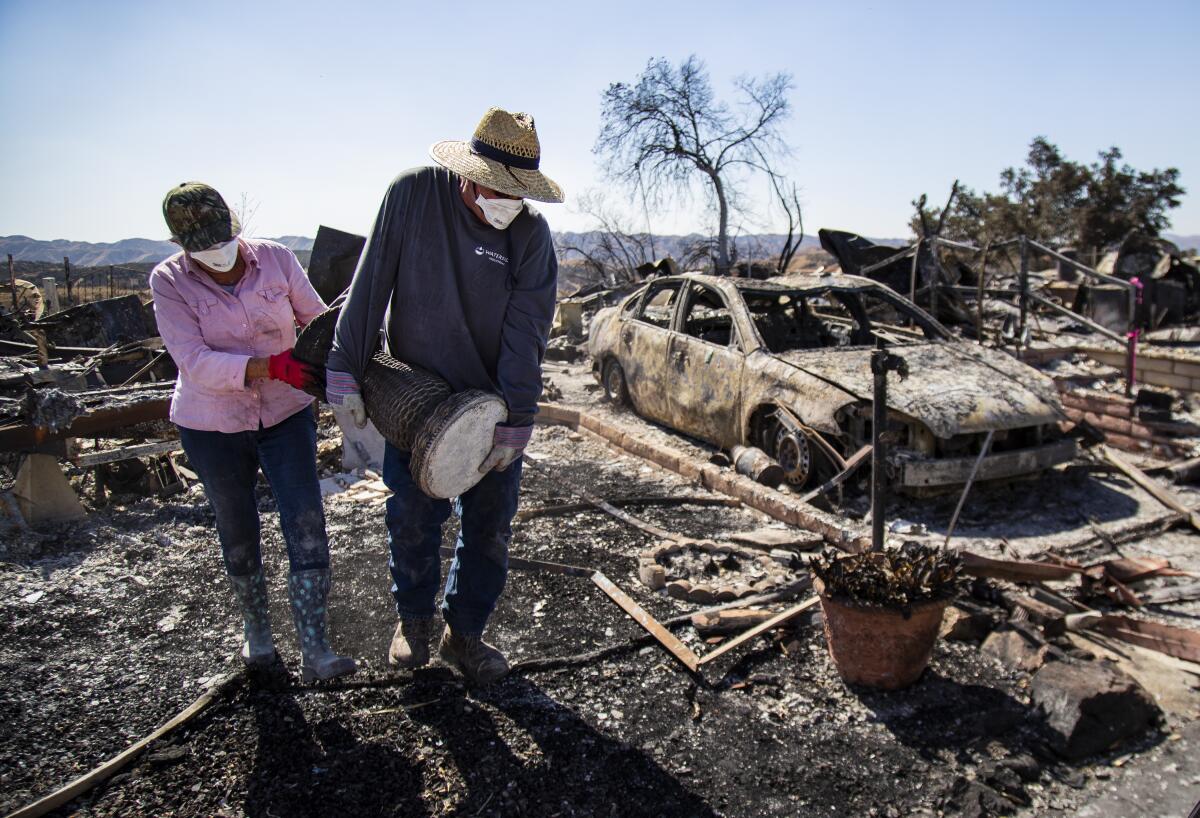
They all got in and Kellison said he nearly rammed into a fire truck as he drove through smoke.
Around that time, in the E section, where Arvickson lived, Lori Piercey was sitting inside her home with the shades drawn to keep out the heat. Her husband wasn’t home, and Piercey, 61, who works as a waitress at Tartan restaurant, had slept in until noon that day. After breakfast, she thought about taking a shower. First, she flung open the door to check the weather and spotted a Cal Fire pickup truck driving by.
“Evacuate,” the driver said.
“Evacuate for what?” she asked.
“Look!”
The wood chips in her neighbor’s yard had turned into a ball of fire. She jammed on tennis shoes and grabbed two things — her flip phone and her work uniform.
Piercey sprinted to her white Mercedes and punched the accelerator. Everything turned black, and she repeated a phrase in her mind: “Please, Jesus, get me out of this park.”
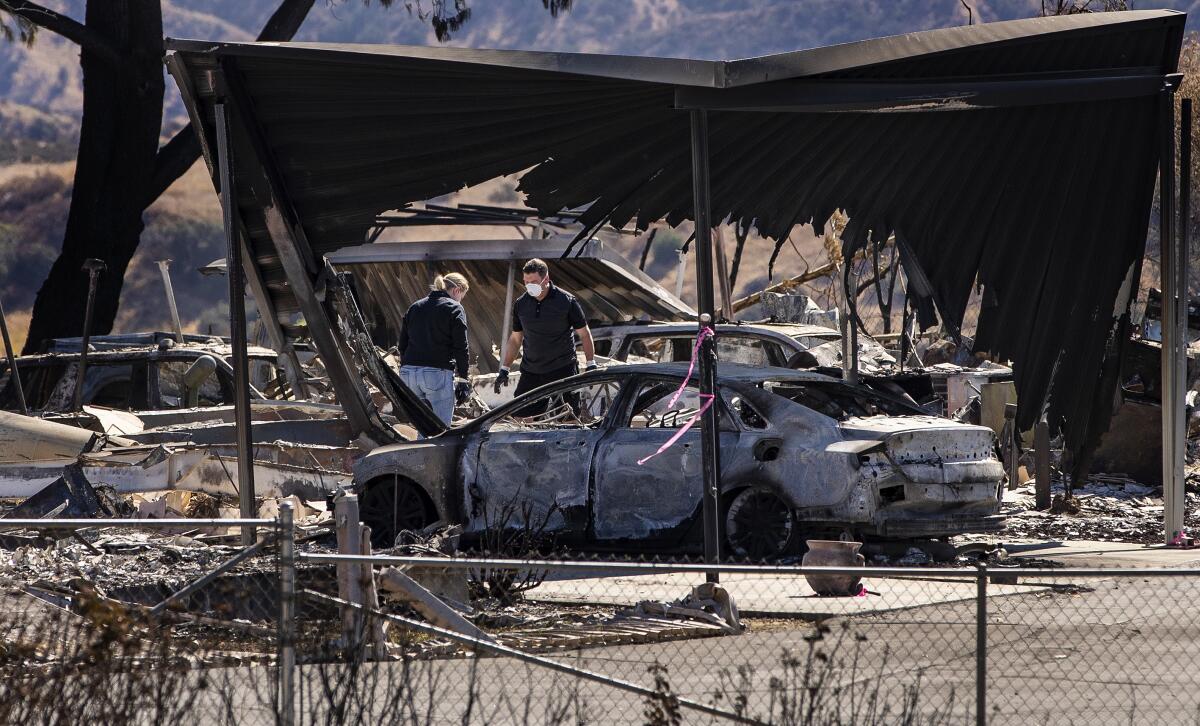
In the days that followed, she thought about all the things that she had left inside: her passport, license and iPad, but also a photo of her father, who has since died, and of her mother, who has dementia. She’d left behind her husband’s Purple Heart medals from his time in Vietnam.
Piercey was struggling to adjust to her new reality. Since the fire, she’s been staying with her mother-in-law in Redlands. For the first time in nearly 20 years, she had called in sick to Tartan on Thursday. And since she hadn’t been around on Monday when officials let residents return for a few minutes, as of Tuesday morning, she was still clinging onto some hope that, perhaps, part of her home was still standing.
“No, babe,” her husband had warned her, “I saw on TV. It’s all gone.”
Nearby, Doug Turner, 68, another of Arvickson’s sons, was recounting memories of his mother, who worked as an administrative assistant at convalescent hospitals while he was growing up. His mother was frugal, he said, often cooking liver and onions for dinner and dressing her four children in hand-me-downs.
She was a deeply kind and fiercely independent person, he said. Even at her advanced age, she had maintained a sharp mind, tearing through mystery books, and she still drove herself to doctor’s appointments and the nail salon. She loved to entertain her 12 grandchildren, 35 great-grandchildren and seven great-great-grandchildren with stories about their family’s deep roots in the desert communities around Calimesa.
“She was exuberant,” Turner said.
Soon, his brother and sister, Judy Dorius, 70, walked over and embraced him. They laughed together about one of their mother’s nicknames — Grandma Blue Goat, for the blue, ’65 Mustang she used to drive. And they recalled how, even though she disliked raw fish, she loved to join them at their favorite sushi restaurants, ordering cucumber salad and edamame.
A few weeks ago, Dorius recalled, her sister had been in town from Oklahoma and their mother was overjoyed to have all four of her children together. They spent most of the time laughing hysterically, and at one point, Arvickson laughed so hard that tears streamed down her face and Dorius snapped a photo of her mother.
Dorius sighed, realizing that was probably the last photo she’d taken of her.
Don Turner said that when his mother first called last Thursday, nothing seemed out of the ordinary. She could see smoke a couple of hills away — usually, he said, that meant a fire in nearby Beaumont.
“OK,” he told her, “keep me posted.”
As he was preparing to drive from his home 50 miles away in Phelan, he got a notification from his mother’s Life Alert system. He hopped back on the phone with his mother, and she asked him what she should do.
“Is anybody there yet?” he asked.
“No,” she said.
“Hit your Life Alert and get out,” he told her.
“It’s on fire,” she said. “I’m going to get my purse and go.” Then the line went dead.
At the time, he thought she meant flames were arriving at the edge of the mobile home park. Now, he realizes she must’ve meant the fire had reached her home.
He rushed south but got stuck in traffic, and when he finally arrived, officials wouldn’t let anyone into the park. He headed to an evacuation center, desperately approaching each time one of his mother’s neighbors arrived. There was one neighbor, in particular, who he thought might have driven his mother, but when they arrived without her, the reality began to sink in.
He checked hospitals and bombarded officials at the command post with questions, and his sister, who lives in San Diego, and his brother, who was vacationing in Fresno, rushed toward Calimesa. Other family members watching news coverage on TV reported what they were seeing.
“We see her mobile and her car,” Don Turner recalled them saying, “and there’s nothing left.”
By Thursday evening, officials confirmed that a body had been found inside the home. To confirm the identity of the charred remains, they said, they would need to get DNA swabs from the children.
By Saturday morning, they knew for certain: Their beloved mother had died inside her home on plot E23 — the home tucked in the back of the park overlooking a canyon.
She had always called it her million-dollar view.
More to Read
Sign up for Essential California
The most important California stories and recommendations in your inbox every morning.
You may occasionally receive promotional content from the Los Angeles Times.











